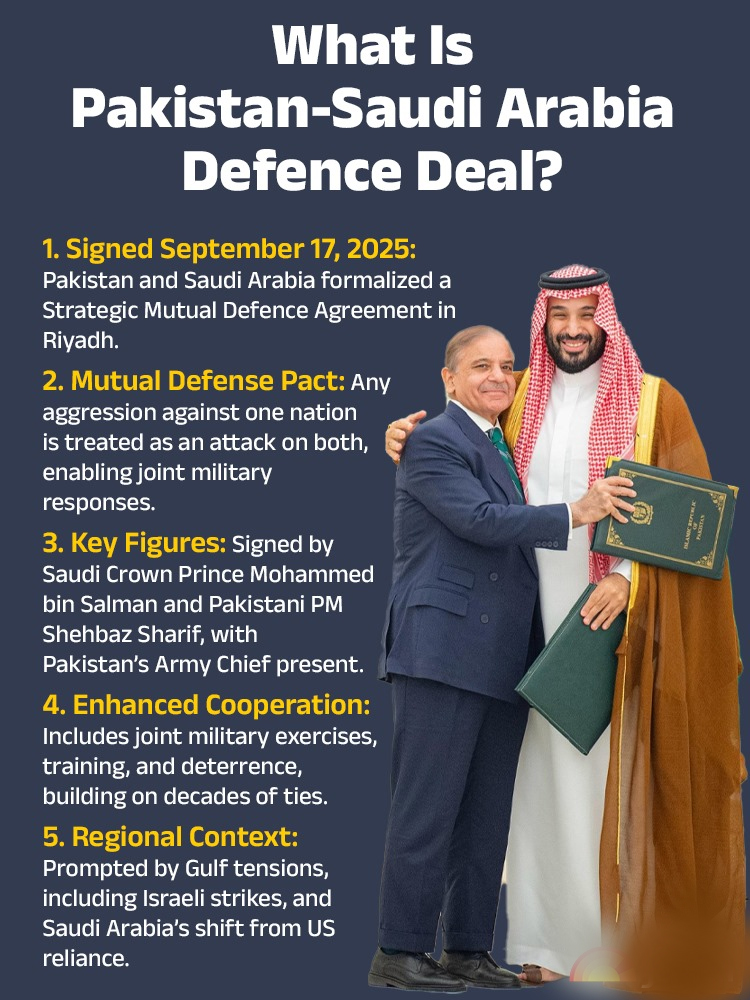Context:
Pakistan and Saudi Arabia recently signed a Strategic Mutual Defence Agreement in Riyadh. A standout clause in the agreement stipulates that “any aggression against either country shall be considered an aggression against both.” The pact aims to boost defence cooperation, strengthen joint deterrence, and deepen the historic partnership between the two nations.
Key Provisions & Their Interpretations:
-
- Joint Defence Obligation: The core clause means an attack on one signatory triggers mutual defence obligations.
- “All Military Means”: The pact allows for the use of “all defensive military means necessary” depending on the threat. This opens up wide latitude.
- No Explicit Naming of Adversaries: The agreement does not specify which country, or countries, might trigger an invocation of the clause. This deliberate ambiguity is likely intended to maintain diplomatic flexibility.
- Joint Defence Obligation: The core clause means an attack on one signatory triggers mutual defence obligations.
Strategic Rationales behind the Pact:
Deterrence in a Shifting Regional Order
o Rising uncertainty about U.S. security guarantees in the Middle East. Gulf states increasingly looking for alternative security partnerships.
o Reaction to recent regional escalations, including Israel’s strike on Hamas in Qatar, which stirred concerns among Muslim nations about collective security.
Formalizing Existing Implicit Ties
o Pakistan has supplied training, advisory support, and earlier defense cooperation with Saudi Arabia without such formal treaty-level obligations. This pact codifies previously informal arrangements.
Potential Signal to Other Powers
o With Iran, Israel, and global powers watching closely, the pact conveys that Saudi Arabia is diversifying its defence relationships.
Religious, Cultural, and Political Bonds
o The agreement is also presented in terms of “Islamic solidarity,” shared strategic history, and mutual interests.
Implications for Regional Security & Neighbouring Powers:
For India
o India has publicly noted that it is studying the implications for its national security.
o While no direct adversary is named, this pact could indirectly impact India given India‑Pakistan tensions. India might need to recalibrate its strategic posture, especially in diplomacy and defence.
For Gulf & Middle East
o Sets precedent for formal mutual defence pacts in a region historically reliant on U.S. security umbrella.
o Could lead to a more bloc‑based security architecture, with Saudi‑Pakistan axis at its core.
o Raises questions for Israel, Iran, and the U.S. about how this pact interacts with their interests.
Nuclear Dimension
o Pakistan is a nuclear‑armed state. Some statements suggest that its nuclear deterrent could factor into defence cooperation.
o However, there is no explicit clause in the public text of the agreement that nuclear weapons will be used in defence of Saudi Arabia. This remains a sensitive ambiguity.
Challenges and Ambiguities:
-
- Ambiguity in Scope: Without naming potential aggressors, or specific threat thresholds, the clause could be invoked broadly or contestably as to what qualifies as “aggression.”
- Operationalization: Joint defence details like troops, bases, logistics, nuclear coordination, etc., are not yet spelled out.
- International & Legal Risks: Possible repercussions under global non‑proliferation norms if nuclear deterring capacity is explicitly shared.
- Diplomatic Balance for Saudi Arabia: Saudi Arabia also maintains strong relations with other regional powers, including India, and will need to balance commitments so as not to alienate others.
- Ambiguity in Scope: Without naming potential aggressors, or specific threat thresholds, the clause could be invoked broadly or contestably as to what qualifies as “aggression.”
Conclusion:
The Pakistan-Saudi Arabia mutual defence pact underscores the evolving nature of regional alliances and security dynamics. As both countries navigate complex geopolitical landscapes, this agreement is likely to have far-reaching implications for regional stability and global security. India, while maintaining a measured stance, will closely monitor the developments and ensure its national security interests are safeguarded.







